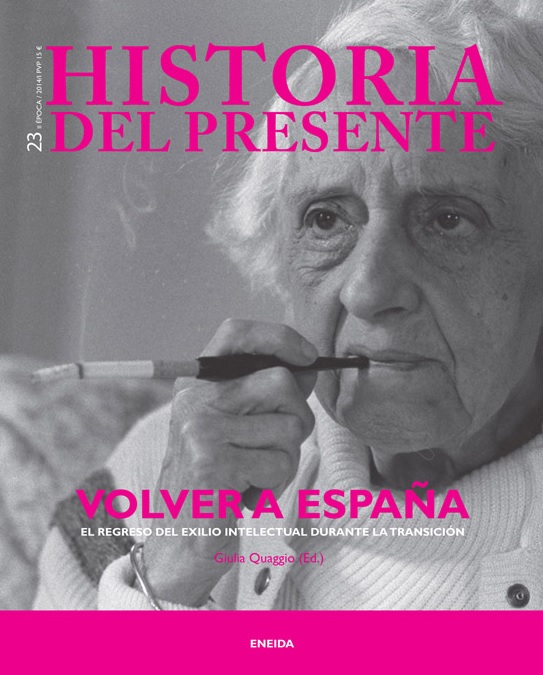La despolitización de la memoria histórica del exilio republicano en democracia: excepciones, paradojas y el caso de Jorge Semprún
DOI:
https://doi.org/10.5944/hdp.23.2014.40647Keywords:
uses of memory, Spanish Republican exile, Spanish Second Republic, Jorge Semprún, historical memory, Spanish transition to democracy, PSOE, political culturesAbstract
This article studies the uses of the Republican past that the Spanish socialist governments of Felipe González engaged in through their promotion of culture and their cultural policies. We argue that the their policy for the recuperation of intellectual figures gave continuity and increased the tendency already started by the first governments of the transitional period, namely the award of prizes and honours, the creation of cultural institutions, and the backing and financial sponsoring of conferences and publications. Such use of the past played a significant role in the symbolic construction of a modern and European image of 1980s Spain, one carefully distant from its authoritarian past. But in order to work, this use of the past required for the concepts, individuals, collectives and institutions constituting it, to be conveniently empied out of their original ideological and political complexity. As a result, monarchy and republic, who were the winners and who the defeated ones of the Civil War, became interchangeable terms, post-political and ideologically malleable concepts. According to the semiotics of transtional Spain and the Spain of the 1980s, the illustrious exile intellectual or politician was a signifier whose signified became reduced to a prestitious past that could best be capitalized with minimum input from the individual in question carrying the sign. As a
result, the evidence of political and cultural agency leading to effective intervention and influence in the course of the Transition and of democracy on the part of this collective is scarce. The second part of the article is precisely devoted to the analysis of one exception to this rule, that of Jorge Semprún. Using his two books of memoirs written in Spanish, Autobiografía de Federico Sánchez and Federico Sánchez se despide de ustedes, we reflect on the ideological evolution of the author and the way it merged with that of the hegemonic left in democratic Spain. The article finishes by pointing to the paradox of how the trivialized visibilization of the Republican past that characterized democratic Spain until the end of the socialist governments of Felipe González created the conditions for the appearence of antagonisms that would in the end be responsible for its demise as a hegemonic discourse of the national past.
Downloads
References
QUAGGIO, Giulia, «Asentar la democracia. La política cultural a través del Gabinete del Ministro Javier Solana», en Mateos, Abdón et al.,...
QUAGGIO, Giulia, La cultura en Transición. Reconciliación y política cultural en España, 1976-1986, Madrid, Alianza Editorial, 2014
BALIBREA, Mari Paz, Tiempo de exilio. Una mirada crítica a la modernidad española desde el pensamiento republicano en el exilio, Barcelona,...
BALIBREA, Mari Paz, «Usos de la memoria de la República y el exilio durante la Transición: los casos de Bergamín y Alberti» en RUIDO, María...
MATEOS, Abdón, «El uso público del antifranquismo y del exilio después de Franco», Alcores 11, 2011. Sin página. Accesible online: http://www.academia.edu/4099903/El_uso_publico_del_exilio_y_del_antifranquismo_en_la_Espana_actual
MATEOS, Abdón, «La política de la memoria de los socialistas hacia la Guerra Civil y el exilio en la España democrática », Historia y memoria...
RICHARDS, Michael, After the Civil War. Making Memory and Re-Making Spain since 1936, Cambridge, Cambridge University Press, 2013
SOTILLOS, Eduardo, 1982. El año clave, Madrid, Aguilar, 2002
GONZÁLEZ, Felipe y CEBRIÁN, Juan Luis, El futuro no es lo que era. Una conversación, Madrid, Aguilar,2001
REAL INSTITUTO ELCANO DE ESTUDIOS INTERNACIONALES y ESTRATÉGICOS (coord.), La política cultural en España, Madrid, 2004
MÉNDEZ, Lourdes, «Política cultural: una retórica sin fronteras », Marquina Espinosa, Aurora (ed.), El ayer y el hoy: lecturas de antropología...
JAMESON, Fredric. «Culture. The Cultural Logic of Late Capitalism», Postmodernism, or The Cultural Logic of Late Capitalism, Durham, North...
MUÑOZ SORO, Javier y GARCÍA FERNÁNDEZ, Hugo, «Poeta rescatado, poeta del pueblo, poeta de la reconciliación: la memoria política de Antonio...
CORONADO RUIZ, Carlota, y MARTÍN SÁNCHEZ, Isabel María, «Exilio y Televisión: la memoria mediática de la represión franquista», Hispania Nova....
RICHARDS, Michael, After the Civil War. Making Memory and Re-Making Spain since 1936, Cambridge, Cambridge University Press, 2013
DÍAZ SÁNCHEZ, Julián, «Memoria y olvido. Sobre la fortuna de los artistas del exilio en la España democrática», Migraciones y exilios, 6,...
HERMANN, Gina, Written in Red. The Communist Memoir in Spain, Urbana and Chicago, University of Illinois Press, 2010
SINNIGEN, Jack, Narrativa e ideología, Madrid, Nuestra Cultura, 1982
SEMPRÚN, Jorge, Autobiografía de Federico Sánchez, Barcelona, Planeta, 1977
RUIZ GALBETE, Marta, «Intelectuales con cabeza de chorlito. Jorge Semprún contra el Eurocarrillismo», Bulletin d’Histoire contemporaine de...
PRESTON, Paul, El zorro rojo. La vida de Santiago Carrillo, Barcelona, Debate, 2013
MUÑOZ SÁNCHEZ, Antonio, El amigo alemán. El SPD y el PSOE de la dictadura a la democracia, Madrid, RBA, 2012
GARCÉS, Joan E., Soberanos e intervenidos. Estrategias globales, americanos y españoles, Madrid, Siglo XXI, 1996
GRIMALDOS, Alfredo, La CIA en España. Barcelona, Debate, 2006
AMARAL, Samuel, «El largo viaje de un rojo español. Del marxismo a la libertad en Jorge Semprún», Revista de instituciones, ideas y mercados,...
KISS, Csilla, «‘La guerre est toujours là’: Defeat, Exile and Resistance in the Works of Jorge Semprún», Bulletin of Spanish Studies, Volume...
SEMPRÚN, Jorge, Federico Sánchez se despide de ustedes, Barcelona, Tusquets, 1993
HUMLEBAEK, Carsten, «Usos políticos del pasado reciente durante los años de gobierno del PP», 2003. Accesible online: http://historiayusodelpasado.files.wordpress.com/2010/12/iii-6-usos-polc3adticos-del-pasado-recientedurante-los-ac3b1os-de-gobierno-del-pp2.pdf.
Downloads
Published
How to Cite
Issue
Section
License

This work is licensed under a Creative Commons Attribution-NonCommercial 4.0 International License.







